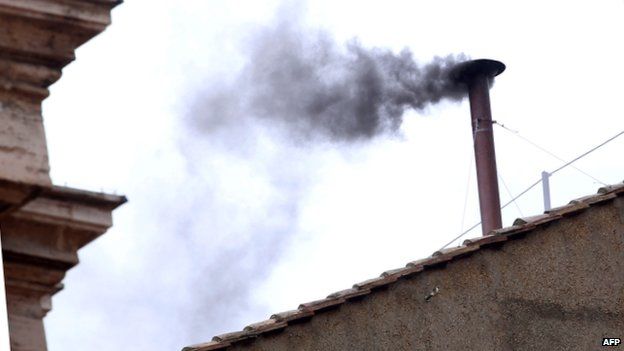Should US elections be more like the papal conclave?
- Published

The papal elections took less than two days to elect a new leader for 1.2bn people. America, on the other hand, is still mired in a months-long process that only brings the country down.
Republicans are gathered near Washington for the 40th annual running of the bulls known as the Conservative Political Action Conference (CPAC). This year, CPAC marks the unofficial beginning of the 2016 presidential campaign.
Sadly.
American campaigns have evolved, or devolved, into ultra-marathons far longer than in any other democracy in the world.
Few Americans would disagree with the propositions that elections are too expensive, that they impede sensible governance, that they devour the time and energy of officials on the taxpayers' payroll and that they have become more obnoxious.
Measured by polling, trust and confidence in politicians, government institutions and the news media have declined steadily since the 1970s when campaigns began their relentless growth.
Reformers have tried to repair the election process with equal relentlessness. Since Watergate, efforts to curb the costs of campaigns have been tried and failed.
Indeed, the flow of money in and out of campaign and special-interest war chests is less transparent than ever. Projects to make debates more enlightening, ads more honest, journalism more highbrow and politics more civil have been tried and tried.
Yet the simplest fix of all, shortening the campaign season, has never been put on the table.
Long elections are an anomaly in US history and internationally.
Most democracies seem to have learned that campaigns bring out the worst in politicians so best to keep them short.
In parliamentary systems, campaigns generally take four to six weeks. The last campaigns in the France and the UK took one month. Israel's last election began on 9 October, 2012 and the voting was held on 22 January. Canada's longest campaign ever lasted 74 days.
It took the Catholic Church and its 1.2 billion followers just a month to elect a new pope.
The official American presidential campaign season lasts 10 months, from the New Hampshire primary in early January to the voting on the first Tuesday in November.
But the overt, semi-official campaign is now between 23-24 months. The new custom is for candidates to officially declare themselves in the months after the congressional mid-term elections, two years before the next presidential vote.
And the unofficial campaign? Well, the 2016 cycle has started.
A few weeks after the inaugural tents were cleared from the Capitol, Jeb Bush, the former governor of Florida, published a new book and appeared on every major political news show.
Senators Rand Paul and Marco Rubio gave "big" speeches at CPAC that were slathered in news coverage and punditry.
New Jersey Governor Chris Christie, the potential candidate the press corps seems to like most for now, wasn't invited to CPAC and that, of course, is an enormous story.
The ills of the Permanent Campaign are obvious.
There is a legitimate argument about whether the cost of campaigns is as malevolent as the press assumes. The last presidential race cost something north of $5bn (£3.3bn) by most estimates.
Some see the ads, emails and tweets this money funds as important expressions of free speech, signs of an engaged and argumentative democracy.
They might add that $5bn is peanuts compared with the money spent advertising snack food, soda pop, beer or cars.
What is not debatable is that campaigning is now a big business. The $5bn spent this cycle doesn't include state and local elections, referenda and mid-term races.
There is a campaign industry, and it has become a vested interest, an industry that wants to grow, not shrink - an industry that doesn't just influence officeholders, it creates them.
My experience is that about nine in 10 members of Congress hate the long campaigns - the perpetual fundraising, the distraction, the triviality, the nasty ads, the indignities.
But there is a professional class of political consultants who love expensive campaigns.
Television stations love campaigns that buy and buy ad time. Reporters love campaigns because they are easier to cover than government, which can be boring and technical.
Perhaps these are some of the reasons why the rather obvious idea of trying to shorten the campaigns we all complain about isn't on the menu of good government reforms.
Legally, it wouldn't be hard to adjust the duration of election races, but the nuts and bolts are tough.
Campaigns are longer because the primary elections where parties choose their candidates come earlier and earlier in election years.
Moving primary elections closer to general elections would solve the problem. The dates of primaries are chosen by state legislatures but are heavily influenced by what the national party organisations want.
If both parties got together to lobby states to shorten the electoral calendar, it would happen. The two parties, for example, co-operate to organise the presidential debates.
Congress could have a role. The uniform general election day - the first Tuesday of November - was established by Congress, not the Constitution. I imagine there are constitutional challenges to Congress making rules about primary dates, but it is an interesting question.
Short of that, the US will need some kind of College of Cardinals to resurrect the older and better way of holding elections.
It shouldn't take so long to declare,Habemus Presidentum.